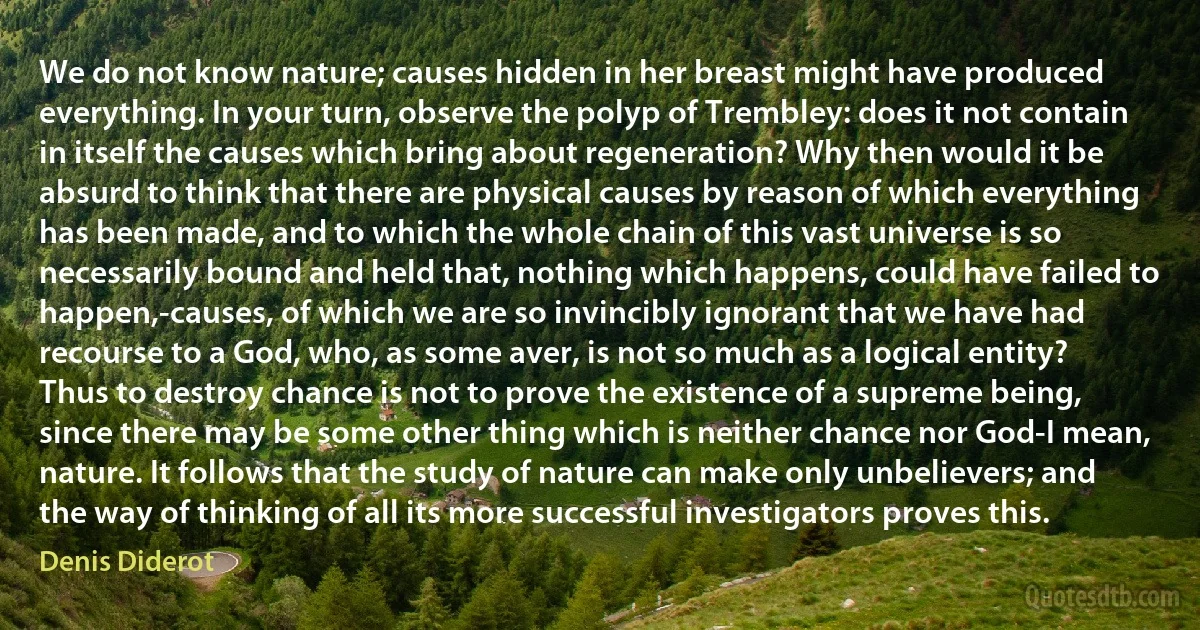Observe Quotes - page 12
In order to receive in the eye all the light diffracted through a narrow opening, and to see the phenomena strongly magnified; still more in order to directly measure the inflection of the light, I placed in front of the objective of a theodolite-telescope a screen in which there was a narrow vertical opening which could be made wider or narrower by means of a screw. By means of a heliostat I threw sunlight into a darkened room through a narrow slit so that it fell upon this screen, through whose opening the light was therefore diffracted. I could then observe through the telescope the phenomena produced by the diffraction, magnified, and yet seen with sufficient brightness; and at the same time I could measure the angles of inflection of the light by means of the theodolite.

Joseph von Fraunhofer
There are moments in life where the question of knowing whether one might think otherwise than one thinks and perceive otherwise than one sees is indispensable if one is to continue to observe or reflect... What is philosophy today... if it does not consist in, instead of legitimizing what we already know, undertaking to know how and how far it might be possible to think otherwise?... The ‘essay' -which must be understood as a transforming test of oneself in the play of truth and not as a simplifying appropriation of someone else for the purpose of communication-is the living body of philosophy, if, at least, philosophy is today still what it was once, that is to say, an askesis, an exercise of the self, in thought.

Michel Foucault
In France at least, the history of science and thought gives pride of place sciences, sciences of the necessary, all close to philosophy: one can observe in their history the almost uninterrupted emergence of truth and pure reason. The other disciplines, however - those, for example, that concern living beings, languages, or economic facts - are considered too tinged with empirical thought, too exposed to the vagaries of chance or imagery to age old traditions and external events, for it to be supposed that their history could be anything other irregular. At most, they are expected to provide evidence of a state of mind, an intellectual fashion, a mixture of archaism and bold conjecture, of intuition and blindness. But what if empirical knowledge, at a given time and in a given culture, did possess a well defined regularity.

Michel Foucault
The men in the laboratory... cannot be said to observe the actual objects of their curiosity at all. ...The sense data on which the propositions of modern science rest are, for the most part, little photographic spots and blurs, or inky curved lines on paper. ...What is directly observable is only a sign of the "physical fact"; it requires interpretation to yield scientific propositions.

Susanne Langer
Propose to any Englishman any principle, or any instrument, however admirable, and you will observe that the whole effort of the English mind is directed to find a difficulty, a defect, or an impossibility in it. If you speak to him of a machine for peeling a potato, he will pronounce it impossible; if you peel a potato with it before his eyes, he will declare it useless because it will not slice a pineapple. Impart the same principle or show the same machine to an American or to one of our Colonists and you will observe that the whole effort of his mind is to find some new application of the principle, some new use for the instrument.

Charles Babbage
If you have the right to work with your hands and to gather the harvest for yourself and your children, have you not a right to cultivate your brain? Have you not the right to read, to observe, to investigate - and when you have so read and so investigated, have you not the right to reap that field? And what is it to reap that field? It is simply to express what you have ascertained - simply to give your thoughts to your fellow-men.

Robert G. Ingersoll
From where I stand, I do not see the lost people of the South Seas, the defeated and the despairing, shrunken shadows of those who went before. What I observe are the proud descendants of some of the most remarkable explorers and settlers who ever lived. We carry the cultural and historical inheritance of ocean navigators of peerless skill and their courageous kin who crossed vast distances before the tribes of Europe had ventured forth from their small part of the earth. Our forebearers populated islands scattered over the world's greatest stretch of water, covering a fifth of the planet's surface. It was one of the most amazing migrations in history, a triumphant testimony to human endurance, fortitude and achievement.

Kamisese Mara
Causality applies only to a system which is left undisturbed. If a system is small, we cannot observe it without producing a serious disturbance and hence we cannot expect to find any causal connexion between the results of our observations. Causality will still be assumed to apply to undisturbed systems and the equations which will be set up to describe an undisturbed system will be differential equations expressing a causal connexion between conditions at one time and conditions at a later time. These equations will be in close correspondence with the equations of classical mechanics, but they will be connected only indirectly with the results of observations.

Paul Dirac
I know that the world I converse with in the city and in the farms, is not the world I think. I observe that difference, and shall observe it. One day I shall know the value and law of this discrepance. But I have not found that much was gained by manipular attempts to realize the world of thought.

Ralph Waldo Emerson
I am not much an advocate for travelling, and I observe that men run away to other countries because they are not good in their own, and run back to their own because they pass for nothing in the new places. For the most part, only the light characters travel. Who are you that have no task to keep you at home? I have been quoted as saying captious things about travel; but I mean to do justice. .... He that does not fill a place at home, cannot abroad. He only goes there to hide his insignificance in a larger crowd. You do not think you will find anything there which you have not seen at home? The stuff of all countries is just the same. Do you suppose there is any country where they do not scald milk-pans, and swaddle the infants, and burn the brushwood, and broil the fish? What is true anywhere is true everywhere. And let him go where he will, he can only find so much beauty or worth as he carries.

Ralph Waldo Emerson
Religion and science don't mix well, as science likes to observe and draw conclusions-to learn, in other words-and religion cares only about learning the Bible, the Torah, the Koran, etc. They don't need to learn about this world, because they already know. A good way to describe a wasted life, as far as I'm concerned. Religious people already know things, with no more proof than some words in an old book. In short, they're crazy.

John Varley
America is preeminently a country of, if not sexual licenses... a country of sexual tolerance, a country of sexual, I... would settle for pluralism, for now. Well, the Holy Mother Church doesn't settle for that. The Holy Mother Church makes rather strict demands. The Holy Mother Church prohibits, by various edicts,... statutes, and pronouncements, all forms of sex that are not specifically devoted to the outcome of procreating further Catholics, and it enforces this with a celibate hierarchy. Now, that's fine, and it is your choice, and... as Mr. Donohue did say, no one has to join that church, but that church, where it can, does try and impose those standards on non-believers and non-members. And there will always seem, to some people, I think, something absurd in the enforcement of such statutes, especially since we know most Catholics don't observe them, by a celibate oligarchy and hierarchy.

Christopher Hitchens
If we observe the aging of individuals, in the period after middle life, it seems to me that we can distinguish three ideal-typical outcomes. Some individuals bear within themselves some psychological sources of self-renewal; aging brings for them accretions of wisdom, with no loss of spontaneity and ability to enjoy life, and they are relatively independent of the culture's strictures and penalties imposed on the aged. Other individuals, possibly the majority, bear within them no such resources but are the beneficiaries of a cultural preservative (derived from work, power, position, etc.) which sustains them although only so long as the cultural conditions remain stable and protective. A third group, protected neither from within nor from without, simply decay. In terms more fully delineated elsewhere, we may have autonomous, adjusted, and anomic reactions to aging.

David Riesman
I was... told by a person who had known him [future Emperor Nicholas II] intimately from his childhood, that, though courteous, his main characteristic was an absolute indifference to most persons and things about him, and that he never showed a spark of ambition of any sort. This was confirmed by what I afterward saw of him at court. He seemed to stand about listlessly, speaking in a good-natured way to this or that person when it was easier than not to do so; but on the whole, indifferent to all which went on about him. After his accession to the throne, one of the best judges in Europe, who had many opportunities to observe him closely, said to me, "He knows nothing of his empire or of his people; he never goes out of his house, if he can help it." This explains in some degree the insufficiency of his program for the Peace Conference at The Hague and for the Japanese War, which, as I revise these lines, is bringing fearful disaster and disgrace upon Russia.

Andrew Dickson White



